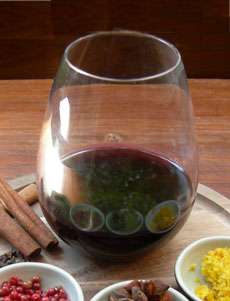NEWS: Red Wine May Fight Alzheimer’s
 In winter, you can go with mulled wine, shown here surrounded by its spices. Click here for the recipe. |
White wine drinkers may want to switch to red. While red wine has been touted for its health benefits for some time (the grapes have high levels of antioxidants), a new study from UCLA and Mount Sinai School of Medicine suggests that the polyphenols in red wine may hinder the formation of protein plaques linked to Alzheimer’s disease. In an article in the November 21 issue of the Journal of Biological Chemistry, the researchers report that in lab tests, the polyphenols in red wine blocked the formation of toxic protein clumps thought to destroy brain cells and induce dementia. David Teplow, a UCLA professor of neurology and senior author of the study, says that “the compounds were shown to block the earliest stages of clumping, suggesting that polyphenols might prevent or reduce disease in humans.” Certainly, a glass of red wine can reduce stress! The study continues at Mount Sinai, testing the effects of grape seed extracts in clinical trials in humans. | |
| Polyphenols are potent antioxidant compounds that have demonstrated greater antioxidant protection than vitamins C and E. The most “famous” polyphenols are the flavonoids in green tea, which may inhibit cancer by blocking the formation of cancer-causing compounds and suppressing the activation of carcinogens. These are the flavonoids catechin, epicatechin, epicatechin gallate, epigallocatechin gallate (EGCG) and proanthocyanidins. Other sources of polyphenols are found in peanuts, white tea, olive oil, pomegranates, certain other fruits and vegetables, and cocoa/dark chocolate. Chocolate or cocoa that has been processed with alkali (“dutched” cocoa) will not contain any polyphenols or antioxidants.
Read more about antioxidants in our Guide To High-Antioxidant Food. |
||

